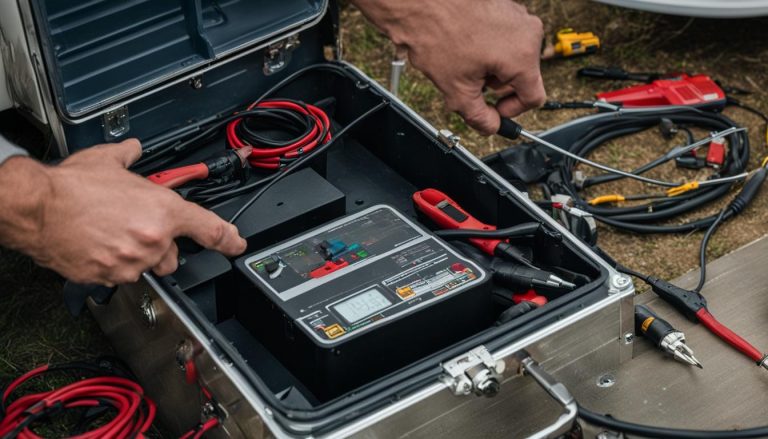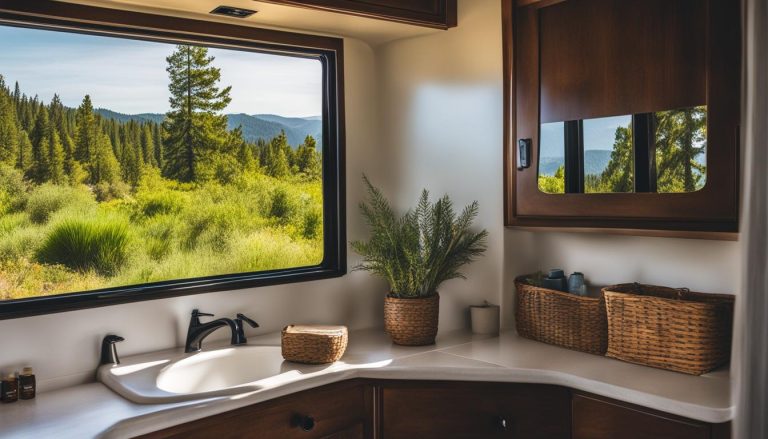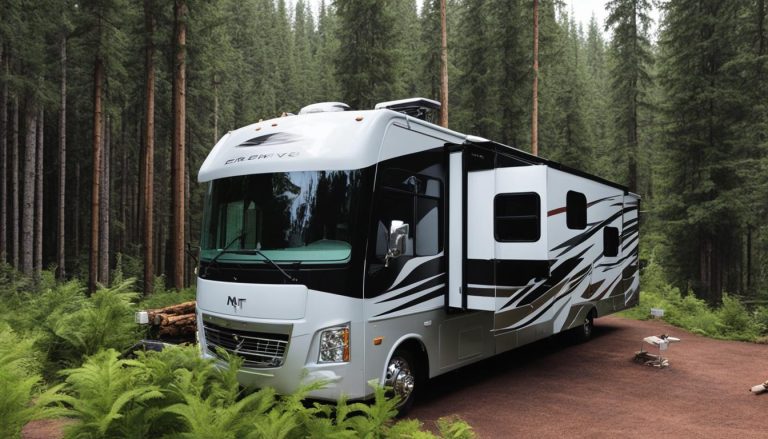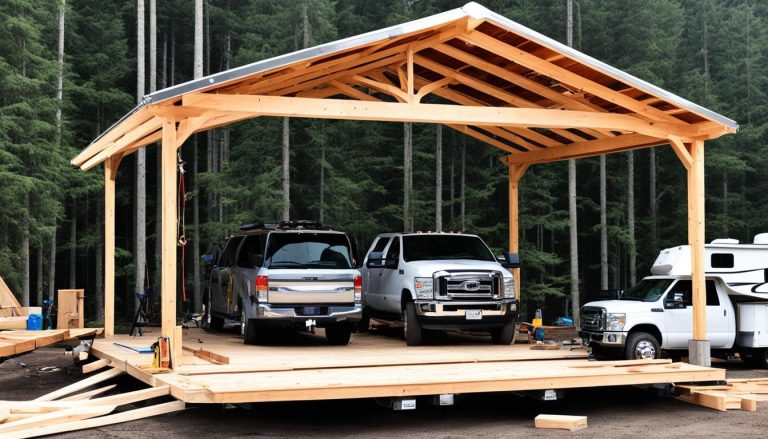Embrace Mobility: How to Live in an RV with Ease
gorvlifestyle.com and its partners may earn a commission if you purchase a product through one of our links
Are you ready to embrace a new way of living and experience the freedom of the open road? RV living has become increasingly popular, especially for retirees seeking adventure, cost savings, and a simpler lifestyle. Living in an RV full time offers a unique opportunity to explore new destinations, connect with nature, and become part of a vibrant RV community.
But before you dive into the RV lifestyle, it’s important to understand the practicalities and considerations that come with it. From choosing the right RV to financial planning and joining RV communities, there are several factors to keep in mind for a successful and enjoyable journey.
Key Takeaways:
- Embracing RV living in retirement offers cost savings, mobility, and a connection with nature.
- Consider financial aspects such as initial investment, ongoing expenses, downsizing, and healthcare.
- Practical tips include choosing the right RV, planning routes, embracing minimalism, and joining RV communities.
- RV living provides benefits like mobility, cost savings, unique experiences, minimalism, and nature immersion.
- Proper planning and preparation are essential before transitioning to full-time RV living.
So, are you ready to hit the road and embark on a new adventure? Let’s explore the world of RV living together and discover the freedom and joy it brings!
The Appeal of RV Living in Retirement
RV living in retirement offers a range of benefits that make it an appealing lifestyle choice. From cost savings to mobility and adventure, downsizing to community and camaraderie, and a deep connection with nature, retiring in an RV opens up a world of possibilities.
Cost Savings and Mobility
One of the primary advantages of retirement RV living is the cost savings it offers. By downsizing from a traditional home to a compact RV, retirees can significantly reduce their living expenses, including mortgage or rent payments, property taxes, and utility bills.
Additionally, RV living allows retirees to embrace a mobile lifestyle. They have the freedom to travel and explore new destinations at their own pace, without the constraints of a fixed location. Whether it’s chasing warmer climates during the winter months or embarking on cross-country adventures, retirees can satisfy their wanderlust and create memories along the way.
Minimalism and Downsizing
Retirement RV living encourages a minimalist lifestyle. With limited space in an RV, retirees are prompted to downsize their possessions and live more intentionally. This process of decluttering allows individuals to focus on what truly matters, shedding unnecessary belongings and simplifying their lives.
Community and Camaraderie
Joining an RV community is an excellent way for retirees to build meaningful connections and establish new friendships. RV parks and communities often host social events, group activities, and gatherings, fostering a sense of camaraderie among residents. Sharing experiences and stories with like-minded individuals can enhance the retirement journey and create lasting memories.
A Connection with Nature
Retirement RV living provides the opportunity to immerse oneself in the beauty of nature. From waking up to breathtaking sunrises over picturesque landscapes to falling asleep under a star-filled sky, RVers have the freedom to experience a closer connection with the natural world. Whether it’s hiking in national parks, fishing in tranquil lakes, or simply enjoying a cup of coffee surrounded by the sights and sounds of nature, RV living allows retirees to embrace the outdoors like never before.
| Benefits of RV Living in Retirement |
|---|
| Cost savings compared to traditional housing |
| Flexibility and mobility to travel and explore |
| Opportunity to downsize and simplify life |
| Chance to build a strong sense of community |
| Connection with nature and outdoor activities |
Financial Considerations of RV Living
When it comes to embracing the RV lifestyle in retirement, it’s important to consider the financial aspects that come along with it. From upfront expenses to ongoing costs, careful budgeting and financial planning are key to ensuring a successful RV living experience.
Let’s break down some of the primary financial considerations:
- Upfront Expenses: The initial investment in purchasing an RV can vary greatly depending on the type, size, and features of the vehicle. It’s important to research and compare prices to find an option that fits your budget and needs.
- Ongoing Costs: Once you hit the road, there are ongoing expenses to consider, such as fuel, maintenance, campground fees, and insurance. These costs can fluctuate depending on your travel habits and the condition of your RV, so it’s essential to factor them into your budget.
- Downsizing: Transitioning to RV living often requires downsizing and decluttering possessions, which can be both liberating and challenging. Selling or donating items you no longer need can help offset the costs of your RV lifestyle and simplify your living space.
- Healthcare and Insurance: It’s crucial to carefully evaluate your healthcare needs and explore insurance options that provide coverage both on and off the road. Working with a knowledgeable insurance agent can help you navigate the complexities of RV living and ensure you have proper protection.
- Budgeting and Financial Planning: Establishing a realistic budget and financial plan is essential for RV living. Consider your sources of income, expenses, emergency funds, and savings goals. Working with a financial advisor or utilizing budgeting tools can help you create a solid financial foundation for your RV lifestyle.
By carefully considering these financial aspects and incorporating them into your overall retirement plans, you can embark on your RV living journey with confidence and financial stability.
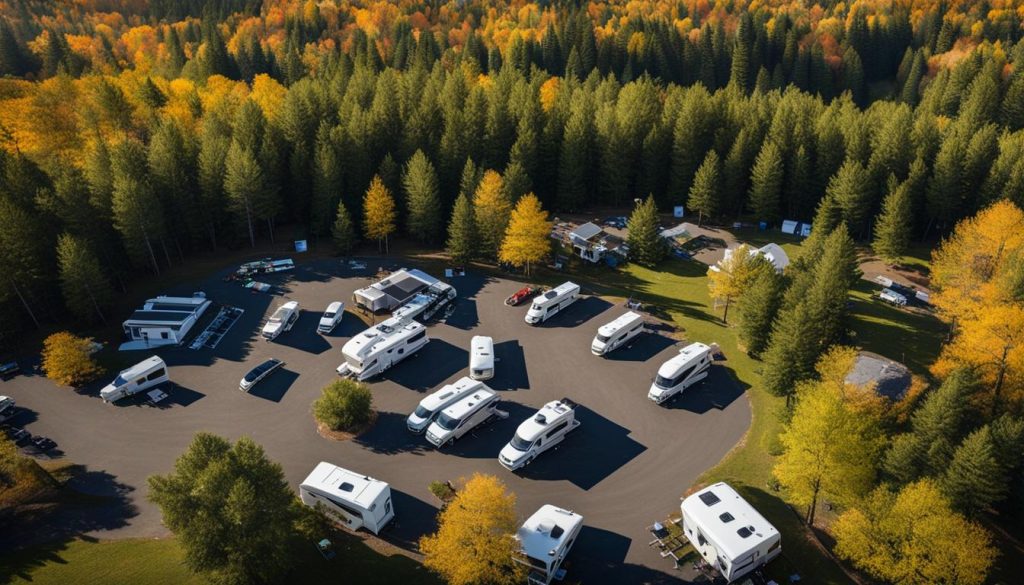
Practical Tips for RV Living in Retirement
Embarking on the adventure of RV living in retirement requires careful planning and preparation. To make the most of your journey, consider these practical tips and tricks:
Choosing the Right RV
When it comes to selecting the perfect RV, it’s crucial to assess your needs and budget. Determine the size, features, and amenities that align with your lifestyle. Whether you prefer a motorhome, fifth wheel, or travel trailer, consider factors such as sleeping capacity, storage space, and fuel efficiency.
Planning Routes and Destinations
Mapping out your travel routes in advance can enhance your RV living experience. Research and plan for scenic routes, RV-friendly campsites, and attractions along the way. This will help you avoid unexpected detours and ensure smooth travels.
Embracing Minimalism and Downsizing
Living in an RV requires embracing minimalism. Before hitting the road, declutter your possessions and only keep what you truly need. Optimize storage space by utilizing organizers and containers to maintain tidiness and reduce clutter.
Joining RV Communities for Support and Socializing
One of the greatest joys of RV living is the camaraderie and support of the RV community. Connect with fellow RVers through online forums, social media groups, and RV clubs. This will provide you with valuable tips, tricks, and a sense of belonging.
Staying Organized in Limited Space
Living in a compact environment requires effective organization. Invest in space-saving solutions such as collapsible furniture, hanging organizers, and multi-purpose items. Designate specific areas for different purposes to maintain order and maximize functionality.
By following these practical tips and incorporating them into your RV living journey, you can create a fulfilling and enjoyable retirement experience on the road.
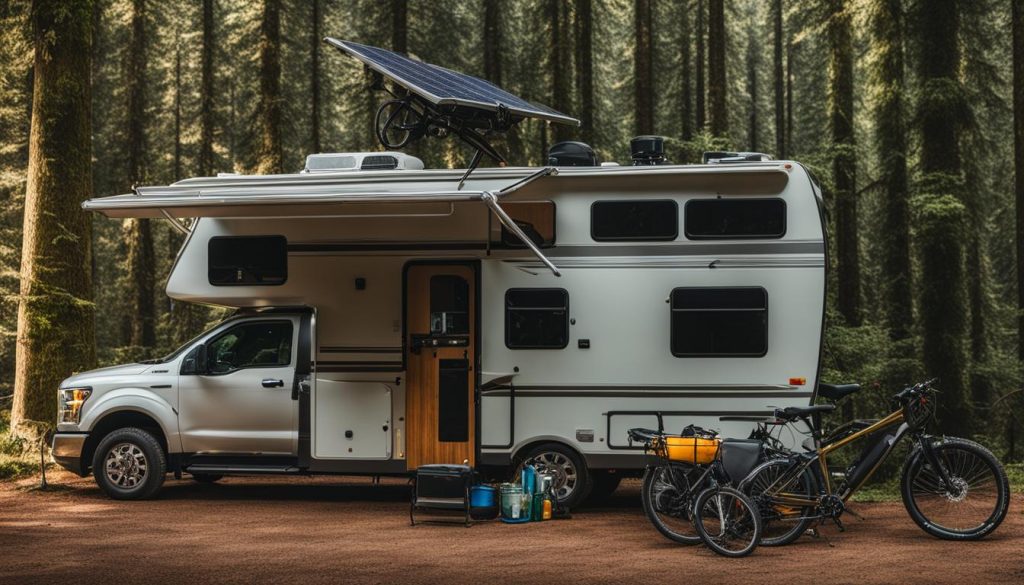
Benefits of Full-Time RV Living
Are you ready to embrace a life of adventure, freedom, and connection with nature? Full-time RV living offers a myriad of benefits that can transform your retirement years into an unforgettable journey. From the flexibility to explore new destinations on a whim to the cost savings compared to traditional housing, living in an RV full-time opens up a world of opportunities.
Mobility and Freedom
One of the greatest advantages of full-time RV living is the ability to be constantly on the move. Whether you’re craving the breathtaking scenery of national parks or the sandy shores of secluded beaches, you have the freedom to travel wherever your heart desires. Say goodbye to the monotony of staying in one place and hello to a life filled with new experiences and unforgettable memories.
Cost Savings
Living in an RV full-time can lead to significant cost savings compared to traditional housing. You can say goodbye to hefty mortgage payments and property taxes. Instead, you’ll have the option to choose affordable campsites or even boondock in beautiful, free-to-stay locations. With reduced living expenses, you’ll have more funds to put towards exploring new destinations, indulging in unique experiences, and embracing the vibrant lifestyle that comes with full-time RV living.
Exploration and Unique Experiences
With full-time RV living, every day brings the opportunity for adventure and exploration. Wake up to the sound of crashing waves on the coast one day and find yourself surrounded by towering mountains the next. Immerse yourself in different cultures, taste diverse cuisines, and engage with local communities across the country. The possibilities are endless, and each day brings a new chance to create extraordinary memories.
Embracing Minimalism
Living in an RV requires downsizing and embracing a minimalist lifestyle. Say goodbye to clutter and excess possessions as you prioritize the items that truly matter. Embracing minimalism allows you to focus on experiences and connections rather than material belongings. You’ll discover the freedom and joy that comes with a simpler life, surrounded only by the things that bring you true happiness.
Nature Connection
Imagine waking up to the sound of chirping birds, stepping outside your RV to feel the crisp morning air on your skin, and being surrounded by awe-inspiring natural beauty. Full-time RV living enables you to cultivate a deep connection with nature. Whether you’re hiking through lush forests, kayaking on serene lakes, or stargazing under clear night skies, you’ll find yourself immersed in the wonders of the natural world. This connection with nature brings not only peace and tranquility but also a renewed appreciation for the Earth’s remarkable landscapes.
| Benefits | Description |
|---|---|
| Mobility and Freedom | Travel anywhere, anytime, and embrace a life of adventure. |
| Cost Savings | Save money by opting for affordable campsites and reducing living expenses. |
| Exploration and Unique Experiences | Discover new destinations, immerse in diverse cultures, and create unforgettable memories. |
| Embracing Minimalism | Foster a simpler, clutter-free lifestyle focused on experiences and connections. |
| Nature Connection | Cultivate a deep connection with nature and appreciate its beauty and tranquility. |
Full-time RV living offers a multitude of benefits that can enhance your retirement years. From the freedom to travel to the cost savings and unique experiences, embracing the RV lifestyle opens up a world of possibilities. Say yes to mobility, adventure, and a meaningful connection with nature as you embark on this extraordinary journey.
Planning and Preparation for Full-Time RV Living
Before you embark on the exciting adventure of full-time RV living, it’s crucial to engage in thorough planning and preparation. By taking the time to consider various aspects of this lifestyle, you can ensure a smooth transition and an enjoyable experience on the road.
Financial Considerations
One of the first steps in planning for RV living is assessing and planning your finances. Consider the initial investment required to purchase an RV, as well as ongoing expenses such as fuel, maintenance, campground fees, and insurance. It’s important to establish a budget that accounts for all these costs and ensures a sustainable lifestyle.
Choosing the Ideal RV
Selecting the right RV is a crucial decision that will impact your comfort and mobility on the road. Evaluate your needs and preferences, such as the size of the RV, sleeping arrangements, kitchen facilities, storage space, and amenities. Research different RV models and consult experienced RVers to find the perfect fit for your lifestyle.
Downsizing and Decluttering
Transitioning to full-time RV living often requires downsizing and decluttering your belongings. Assess your possessions and determine what is essential for your new lifestyle. Embrace minimalism and only bring items that serve a practical purpose or hold sentimental value. This process can be liberating and will help create a more organized and comfortable living space in your RV.
Legal and Administrative Prerequisites
Before hitting the road, familiarize yourself with the legal and administrative requirements associated with RV living. This includes understanding vehicle registration and insurance regulations, obtaining necessary licenses and permits, and ensuring compliance with local laws. Research any additional prerequisites specific to your intended travel destinations.
“Careful planning and preparation are the keys to a successful full-time RV living experience. Take the time to assess your financial situation, choose the ideal RV, downsize your possessions, and understand the legal requirements. By doing so, you’ll be ready to embrace the freedom and adventure that awaits.”
Now that you are equipped with valuable insights into planning and preparation for full-time RV living, you can confidently embark on this thrilling and fulfilling lifestyle. By addressing the financial, practical, and administrative aspects, you’ll set yourself up for a memorable journey on the open road.
Establishing a Home Base for Full-Time RV Living
When embarking on a full-time RV living adventure, it’s crucial to establish a home base that provides stability and support. Selecting the right domicile state is one of the first decisions to make. Look for states with favorable regulations for RVers, such as no state income tax or low vehicle registration fees. Popular choices among RVers include Florida, Texas, and South Dakota.
Managing mail and addresses can be a challenge while constantly on the move. Utilizing mail forwarding services can help ensure your mail is delivered promptly and securely. These services allow you to have a permanent mailing address even if you’re constantly changing locations. Look for reputable services that offer scanning, package forwarding, and mail storage options to cater to your specific needs.
Understanding the legal requirements for vehicle registration and insurance is essential to stay compliant while on the road. Each state has its own laws and regulations regarding these matters. Research the specific requirements of your chosen domicile state and ensure that your vehicle is properly registered and insured, providing you peace of mind during your travels.
FAQ
How can I embrace mobility and live in an RV with ease?
Embracing mobility and living in an RV with ease involves selecting the right RV for your needs and budget, planning your travel routes, embracing minimalism and downsizing your possessions, joining RV communities for support and socializing, and staying organized in the limited space of an RV.
What are the appeals of RV living in retirement?
RV living in retirement offers benefits such as cost savings, mobility and adventure, minimalism and downsizing, community and camaraderie, and a deep connection with nature. Retirees can downsize their living expenses, explore new destinations, declutter their lives, make new friends in the RV community, and immerse themselves in the beauty of nature.
What financial considerations should I keep in mind when living in an RV?
RV living involves financial considerations such as the initial investment in purchasing an RV, ongoing expenses like fuel and maintenance, downsizing possessions, healthcare and insurance, and budgeting and financial planning. Retirees should carefully consider their budget, income sources, downsizing possessions, and overall financial planning to ensure a successful RV living experience.
What are some practical tips for RV living in retirement?
Practical tips for RV living in retirement include choosing the right RV based on needs and budget, planning travel routes, embracing minimalism and downsizing possessions, joining RV communities for support and socializing, and staying organized in the limited space of an RV.
What are the benefits of full-time RV living?
Full-time RV living offers benefits such as mobility and freedom to travel, cost savings compared to traditional housing, unique experiences and exploration of new destinations, embracing minimalism and intentional living, and a deep connection with nature.
What planning and preparation should I do for full-time RV living?
Before transitioning to full-time RV living, careful planning and preparation are essential. Considerations include financial planning, choosing the ideal RV based on needs and budget, downsizing and decluttering possessions, and understanding the legal and administrative requirements of RV living.
How can I establish a home base for full-time RV living?
Establishing a home base is important for full-time RV living. Factors to consider include selecting a domicile state with favorable regulations, managing mail and addresses through forwarding services, and understanding the legal requirements for vehicle registration and insurance. Establishing a stable home base provides stability and support for a mobile RV lifestyle.

